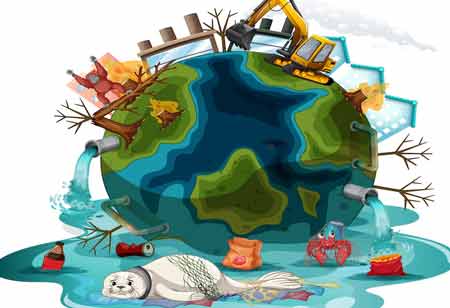Thank you for Subscribing to Environmental Business Review Weekly Brief
Shaping the Future with Insights into Environmental Consulting
Environmental consulting is rapidly growing, driven by sustainability demands, regulatory changes, ESG priorities, and technological advances, helping businesses navigate compliance and adopt eco-friendly practices.

By
Environmental Business Review | Thursday, September 11, 2025
Stay ahead of the industry with exclusive feature stories on the top companies, expert insights and the latest news delivered straight to your inbox. Subscribe today.
Environmental consulting plays a crucial role in tackling global challenges such as pollution, climate change, resource depletion, and biodiversity loss. These firms support businesses, governments, and organizations in managing environmental risks, ensuring regulatory compliance, and implementing sustainable practices. As awareness of ecological impacts increases and regulations tighten, along with rising public expectations for corporate responsibility, the industry continues to see strong growth. As businesses and governments persist in prioritizing environmental sustainability, many seek the expertise of top environmental consulting services providers to help them achieve their goals. These providers are critical in shaping sustainable futures across various industries, ensuring businesses meet today's regulatory and environmental demands.
Current Landscape of the Environmental Consulting Industry
The environmental consulting industry has grown significantly as global demand for sustainable practices and regulatory compliance increases. Environmental consultant firms offer various services to address pollution, resource management, environmental sustainability, and environmental risk assessment. These firms often work alongside private and public sector organizations, assisting them in navigating the intricacies of environmental regulations and providing guidance on reducing their ecological footprint. As industries work to comply with stricter environmental standards, the role of consultants becomes indispensable. The industry's continued expansion can be attributed to heightened awareness surrounding climate change, more stringent regulations, and the growing need for businesses to integrate sustainability into their operations. This trend is expected to maintain momentum as businesses and governments prioritize environmental responsibility.
In recent years, several market trends have further shaped the trajectory of the environmental consulting industry. A notable shift has been the increasing demand for services regarding climate change mitigation and adaptation strategies. Environmental consultants are increasingly called upon to help businesses assess their carbon footprints and develop plans to reduce emissions. This includes not only the evaluation of greenhouse gas emissions but also strategies for transitioning to renewable energy sources and implementing energy-efficient practices. The heightened focus on climate resilience has resulted in an upsurge of projects aimed at helping communities and businesses adapt to climate impacts, such as rising sea levels, extreme weather events, and resource scarcity.
There is a rising priority on circular economy practices, where consultants provide valuable insights on waste reduction, resource efficiency, and recycling. Companies strive to decrease their environmental impact by implementing more sustainable business models, and environmental consultants are crucial in guiding these transitions. As a result, firms that can offer expertise in waste management, sustainable supply chains, and product lifecycle assessments are experiencing a surge in demand.
Another significant trend is the growing need for environmental, social, and governance (ESG) reporting. As investors and stakeholders increasingly prioritize sustainability, companies must provide transparent ESG disclosures. Environmental consultants are stepping in to help firms establish and monitor their ESG metrics, ensuring they meet the evolving expectations of shareholders and regulatory bodies. This trend is particularly prominent among multinational corporations and publicly traded companies seeking expert guidance to enhance their sustainability practices and stay competitive in an environmentally conscious market.
Challenges and Solutions within the Environmental Consulting Sector
One of the primary challenges environmental consulting firms face is the evolving regulatory landscape. As environmental laws and policies change and become more stringent, consultants must stay updated with new guidelines to ensure their clients remain compliant. This rapid regulatory evolution can be challenging to manage, especially when firms must quickly adapt to shifting government standards. A viable solution to this challenge is implementing continuous training programs for consultants. By promoting a culture of consistent learning and staying updated on legal changes, consultants can provide clients with punctual and accurate advice. Employing technology and software tools that track regulatory updates can streamline compliance efforts.
Another significant challenge in the environmental consulting industry is the increasing competition. With the growing demand for environmental expertise, the number of firms offering similar services has also expanded, creating a highly competitive market. Firms must differentiate themselves through specialized services or niche expertise to stand out. One way to tackle this challenge is by adopting innovative solutions and cutting-edge technologies. By investing in environmental technologies such as remote sensing tools, artificial intelligence, and data analytics, consultants can offer clients more efficient and accurate assessments, giving them a competitive advantage.
Opportunities and Advancements Benefiting Stakeholders in Environmental Consulting
Environmental consultant firms are positioned to take advantage of many opportunities as technological advancements and sustainability practices continue to evolve. One of the most promising areas for growth is integrating digital tools such as geographic information systems, environmental modeling software, and remote sensing technologies. These innovations enable firms to offer more precise data and predictive analytics, enhancing their ability to assess environmental impacts and recommend more sustainable solutions.
Environmental consulting firms have growth opportunities in corporate social responsibility (CSR) as businesses seek to align with societal expectations for environmental responsibility. Consultants can help identify sustainable practices, set environmental performance goals, and monitor progress.
Furthermore, firms can tap into the expanding renewable energy and green building sectors. With the global shift towards solar, wind, and hydropower, consultants provide essential expertise in site selection, environmental impact assessments, and regulatory compliance, meeting the rising demand for sustainable and energy-efficient designs.
More in News





